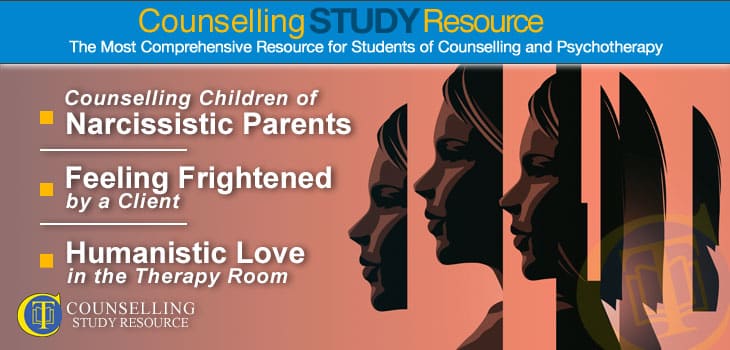119 – Counselling Children of Narcissistic Parents
Feeling Frightened by a Client – Humanistic Love in the Therapy Room
In episode 119 of the Counselling Tutor Podcast – the last of this season – Ken Kelly and Rory Lees-Oakes talk about counselling children of narcissistic parents. In ‘Practice Matters’, Rory explores what to do when you find a client frightening. Finally, the presenters look at humanistic love in the counselling room.
Counselling Children of Narcissistic Parents (starts at 1.30 mins)
Growing up with a narcissistic parent is very challenging for a child, who is likely to feel vulnerable and unloved, trying desperately to please the parent but to no avail.
On top of all this, children often learn their attachment style from their parents.
These experiences can lead to the child becoming an adult who – feeling unlovable and isolated – either shuts off from others or goes to the other extreme and is desperate for love (perhaps getting involved in inappropriate sexual relationships in a bid to find this).
When counselling children of narcissistic parents, counsellors have much of value to offer these clients, through providing the core conditions.
However, receiving these may well be so alien to the client that it feels scary to them. It can be really difficult for such clients to accept help from others.
It is therefore very important, when counselling children of narcissistic parents, to be there for the client but on their terms, treading slowly and carefully in how you relate to them, within their frame of reference.
This type of work requires much patience, and is likely to be long-term. It involves helping the client – who is likely to have very low self-worth – to find and nurture their real self.
Feeling Frightened by a Client (starts at 8.45 mins)
Sometimes, you may find yourself feeling frightened by a client even though they have not shown any aggression.
Rory talks about how to work with this, separating out any real risk from feelings that relate to your own process (e.g. fear based on countertransference).
Rory’s handout on this topic can be downloaded here; it is also available through the Counselling Study Resource (CSR).
Humanistic Love in the Therapy Room (starts at 20.15 mins)
Rory talks about a book by psychoanalyst Erich Fromm, The Art of Loving (HarperCollins, 1995), which describes the different types of love, each of which has its own nuances:
- romantic love
- parental love
- sibling love
- erotic love
- self-love
- divine love
Humanistic love is what we show the client in the therapy room: not all counsellors manage to do so, but even the best counselling skills in the world are incomplete without this vital ingredient.
To experience humanistic love towards clients, it’s important to see them as equal individuals – as fellow travellers in the world.
Truly experiencing the core conditions – in particular, deep empathy and unconditional positive regard – is key here.
Humanistic love is one aspect of the counsellor–client relationship that clearly separates it from the professional clinical relationship often offered in healthcare.
Ken and Rory feel this is best described as ‘spiritual’ – not in the sense of religion, but referring to the meeting of our real selves.
Philosopher Martin Buber referred to this type of relationship as ‘I–Thou’ and contrasted it with ‘I–It’ relationships, in which the other person is viewed more as an object than as a fellow human being.
Free Handout Download
When Clients Frighten You
